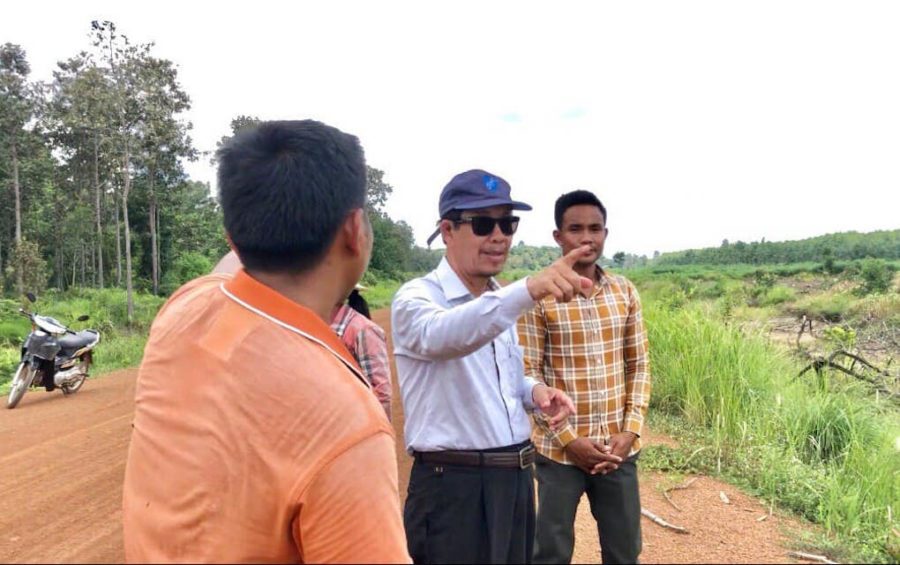Defense and government lawyers, and even the judge, exchanged fiery accusations over alleged prejudgement, criminal intentions, lack of evidence and use of a controversial ethnic slur in a tense first trial hearing against labor leader Rong Chhun on Friday.
The Phnom Penh Municipal Court opened its trial in the morning against Chhun, Khmer Win Party leader Suong Sophorn, Khmer Thavrak activist Sar Kanika and Ton Nimol, who was arrested after protesting outside the Chinese Embassy, for incitement to disturb social security. Only Chhun was questioned on Friday.
Chhun was arrested in late July over a statement he issued alleging irregularities and incursions at the Vietnamese border. Sophorn and Kanika were arrested amid protests in his support.
As the hearing commenced on Friday, defense lawyers immediately raised objections over the presence of government lawyers, citing articles from the Criminal Procedure Code that criminal cases are brought by state prosecutors. Government attorney Chhit Boravuth, however, pointed to a royal decree establishing a government lawyer group, while prosecutors cited an article in the code that a civil action can be brought in conjunction with a criminal action.
The court then probed the status of Chhun’s Cambodia Watchdog Council, Cambodian Independent Teachers Association and Cambodian Confederation of Unions, and the details of Chhun’s investigation into border issues.
Chhun said he had visited the border area in Tbong Khmum province for a day, speaking to about 20 people, after seeing a news report from the U.S.-run Radio Free Asia.
Judge Li Sokha questioned Chhun about his intentions in posting about the border and what evidence he had that people had really lost their land to a foreign state, including exact locations and dates.
“What is your intention in posting this statement?” Sokha asked.
“It was aimed to get an intervention from the government,” Chhun said.
“Do you know clearly that they really lost the land?” Sokha asked.
“If they said it like that, who would know more than them?” Chhun replied, though he acknowledged that he had not been provided any documentation.
Chhun repeatedly rebuffed similar questions about whether he had clear evidence.
“If you aren’t clear, it means you wrote [the post] to cause a misunderstanding against the government. [The situation] is not like what you had thought,” Sokha said. “The government has all the documents.”
Defense lawyers Sam Sokong and Choung Choungy both stood up in protest, arguing the judge had made a prejudgement in an ongoing trial.
Deputy prosecutor Seng Heang also stood up, defending the judge that he was only trying to find the truth. As the prosecution and defense exchanged words, Judge Sokha pounded his hand against the podium.
Sokha continued that Chhun’s message had caused misunderstanding and anger against the government, to which Chhun raised his finger and shot questions back at the judge. Sokha said Chhun didn’t have the right to ask questions, though he could submit more evidence if he had any.
The deputy prosecutor asked whether Chhun worked with a border expert or had the background to evaluate the issues. Chhun refused to answer most of the questions.
“The content is just quoting people and does not affect public order,” Chhun said.
Government lawyer Boravuth focused on Chhun’s use of the word “yuon” in his statement.
“You used the words yuon’s side, yuon authority. What does it mean?” Boravuth asked.
“It means nothing,” Chhun said, arguing that even Cambodia’s classic dictionary, by Chuon Nath, contained the word.
“You are an intellectual. You must know how to use the word to get attention,” Boravuth said.
“I am surprised you raised the word yuon to question [me]. Since the beginning, our country has used the word yuon,” Chhun said.
Opposition leader Sam Rainsy and others have defended the use of the word as traditional for Khmer people, as they rallied populist anti-Vietnamese sentiment in past elections. “If I win this election, I will send the yuon immigrants back,” Rainsy said in 1998, according to the Cambodia Daily. Rainsy has retorted that the word was only deemed derogatory by “Westerners” and had been politicized by the ruling party.
After further questioning about his claims of 60 hectares of disputed land between border markers 114 and 199, Chhun argued against the incitement charge, saying that there had been no disturbance of social security in the 10 days from when he issued the statement on July 21 to his arrest on July 31. Protests only began after his arrest, he said.
The court was also shown a few videos, including a Radio Free Asia report and Chhun driving a motorbike and talking to local people.
Judge Sokha said the hearing will continue on February 3.













